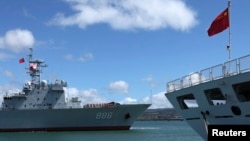Despite Beijing’s rejection of the recent tribunal ruling on the South China Sea issues, the U.S. military keeps pushing for closer ties with the People's Liberation Army.
Admiral John Richardson, chief of U.S. naval operations, visited China this past week, while the PLA continues participation in U.S.-led Rim of the Pacific Exercise in Hawaii.
Carl Schuster, former director of operations at the Joint Intelligence Center of the U.S. Pacific Command, told VOA the U.S. still considers China a partner in maintaining global security.
“The message we are sending is: We are not happy with what you are doing in the South China Sea, but nothing you have done is irrevocable, and we still see you as a partner, we still want to work with you. And above all, we are not your enemy,” Schuster said.
In an interview with VOA in Hawaii after visiting a PLA ship there in July, Mark Swain, principal director for humanitarian assistance at the Office of Secretary of Defense for Policy, said China can and should be a partner in humanitarian assistance.
“We have proved here countries can work together for humanitarian assistance, to provide for needed assistance to citizens affected by some disasters,” he said.
Schuster thinks, however, that the military-to-military relationship between the U.S. and China can take a dramatic turn if Beijing conducts some irrevocable act, such as declaring an Air Defense Identification Zone in the South China Sea. A zone of this kind signifies airspace in which the identification, location and control of civil aircraft is performed in the interest of national security.
“Is the deterrence value and the engagement value of working with them, does that compensate for the secrets they learn and what they learn about us?" he said. "As a general rule, as long as you are not enemies, the answer is yes. The payoff exceeds the risk. But if you believe they are out to do some irrevocable set of acts, then the answer is no.”
Some observers are concerned that China may engage in what the United States considers irreversible behavior in the South China Sea, including announcing the establishment of the South China Sea Air Defense Identification Zone by 2020.
This report was produced in collaboration with VOA's Mandarin service.




